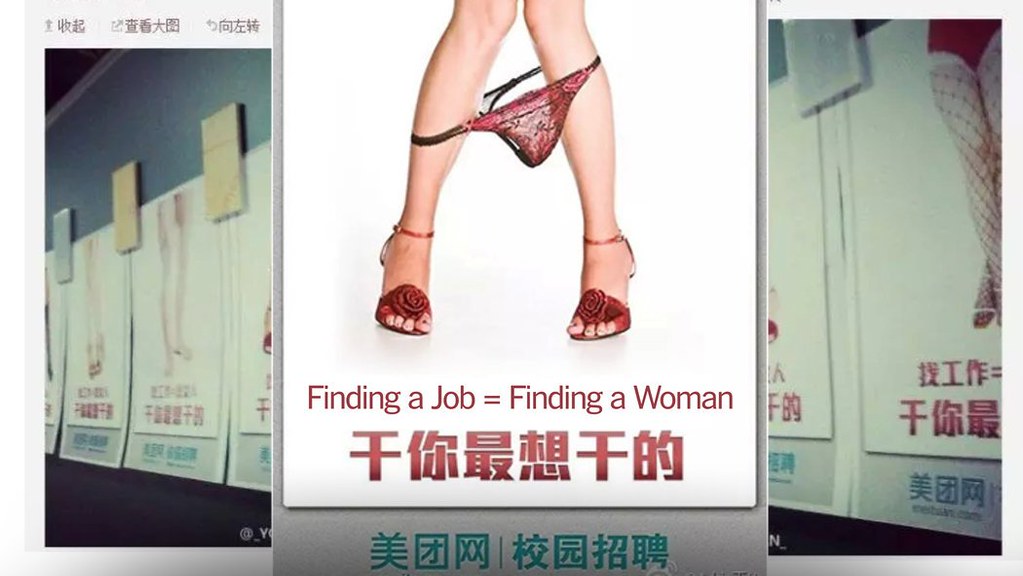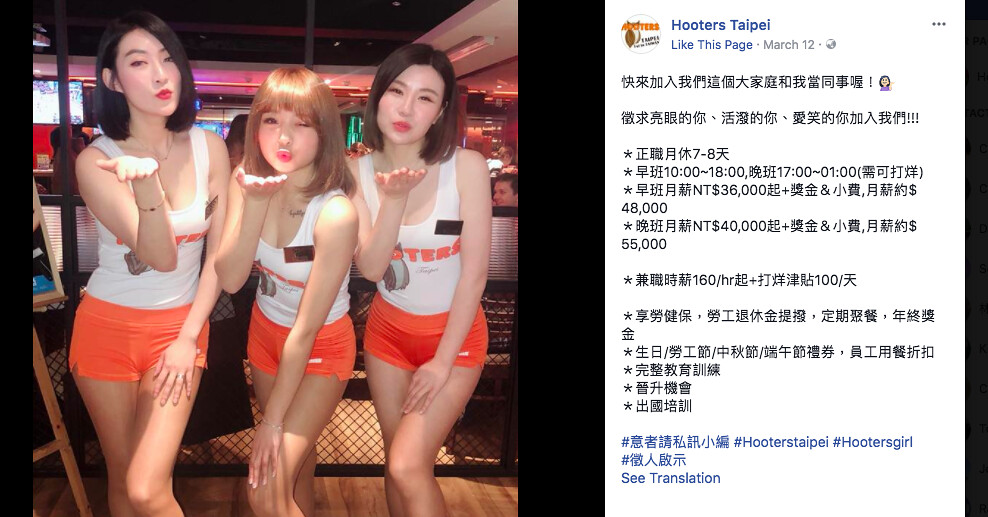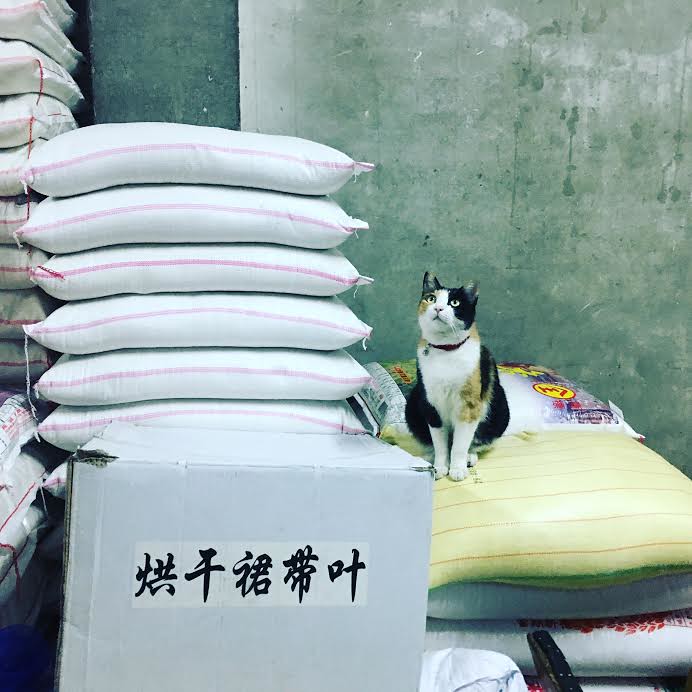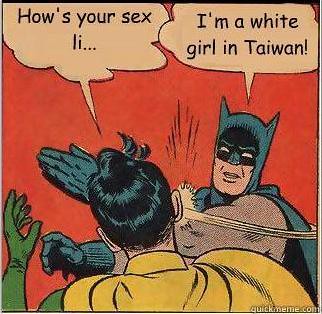 |
| I have no desire to translate the rest of this for you. It's just as sexist as it looks. |
For years, I have initiated or participated in discussions of the relative level of women's rights and equality across various countries in Asia. For years, I have posited that while Taiwan isn't exactly great when it comes to women's equality (I struggle to find a society that is), it is the best country by far in Asia for women. The problem is that "in Asia" is a low bar, even when you adjust your expectations of how feminism might look in Asian societies.
Along these lines, a spate of news and opinion pieces appeared recently on how badly women are treated - just how much they are objectified and male needs are prioritized - in the tech industry in China (and, according to Zhang Lijia, whose video op-ed is linked to below, in Chinese civil service recruitment as well, with a number of jobs listed as requesting male candidates).
Chinese Tech Companies' Dirty Secret (watch this one first, and be horrified)
Alibaba, Baidu and other Chinese tech companies post men-only job ads
Wanted at Chinese start-ups: attractive women to ease coders' stress
In all of these pieces, the biggest horror in my view is the ad that says "Finding a Job = Finding a Woman: Fuck What You Want to Fuck". I truly have no words.
Through those years, the biggest point of contention I've come across is a belief that Chinese women actually have it better - have more equality, get more respect from their society - than Taiwanese women. Talk about how in Shanghai, women rule and men do as their wives and mothers say (I haven't really found anything to corroborate this beyond what people say; I suspect it's an urban legend to some degree). Talk about how Communism sucks but at least one of its ideals is gender equality (maybe true under Mao, not so much anymore). Talk about how there are more female engineers and women in traditionally male fields in China - I saw 39-40% cited on a number of websites, but none I'd trust as a source especially given the links above).
But, you know what? I just don't believe that. I never have. I lived in China, I saw how women - in several unrelated examples where I knew the people involved personally - were treated as a matter of course. I saw, with my own eyes and through personal stories told to me, how many men in China really thought they had the right to "fuck what they want to fuck" - in some cases, literally.
In short, what I saw and heard didn't add up to this belief that "China is a gender equality leader in Asia" or that it somehow outpaces Taiwan in gender equality.
Now, I can say with confidence that I was right.
I set out to see if such job ads were common (or even rare but extant) in Taiwan, and while I would not call my look into the issue a feat of investigative journalism (it really wasn't), I did ask a wide range of people both online and off, including a number of female professionals that I know, to see if they'd even come across such an ad. I included questions not just about sexist ads targeting men (showing Zhang's examples in the vomit-inducing video above), but also ads stating explicit gender preferences or appearance requirements. I specifically did not include ads for foreign teachers, which are their own cesspit of sexism and general unprofessionalism (I'll discuss that topic below). I trawled 591 for a bit, but it's huge and I admit I barely made a dent.
Nobody - no-one on Facebook, no-one in real life, none of the professional Taiwanese women I asked - had seen anything like this in Taiwan, nor could I find any evidence of it. Every last one was positive that any company that even attempted these sorts of recruitment tactics in Taiwan would get sued so fast that the Apple Daily issues would still be literally hot off the press when the subpoena arrived.
The best I could find was one woman - a female programmer - who said there were rumors of the sorts of "engineer comfort women" (she did not mean the term in the way it is typically used in Asia, the point was to be more of an at-work hostess, not to actually provide sexual services) discussed in the third link above also exist in Taiwan. However, I could not find a Taiwanese ad for such a job.
On the contrary, I was alerted to several instances where gender discrimination in hiring in situations that might actually be open for debate were met with lawsuits: in one case, a "maid cafe" (where female servers dress up like maids - it's a subculture thing that I think is a bit tacky but is not worth my time to complain about - whatever)
that would not accept a male applicant, citing its uniform of short skirts as awkward for men to wear, and was fined NT$150,000. (Link in Chinese). While I think it's relatively likely that the male applicant purposely called up the maid cafe to hear that he wasn't welcome to apply based on his gender so that he could complain, it doesn't matter: in Taiwan, it doesn't matter if you are explicitly a maid cafe. If it can be proven that you are discriminating based on gender, you are likely to lose any lawsuit that is filed. In another well-publicized case,
China Airlines listed height requirements for flight attendants, saying they needed to be able to help passengers put luggage in overhead compartments. They also lost.
One of the women I asked pointed out that, as a C-level executive with hiring powers, she has to attend a workplace gender equality training regularly, and that it confirmed what the maid cafe link mentions above: the court ruled that very few jobs could restrict hiring based on gender, citing underwear modeling as one such exception (I dunno, I think an ad for boxers where the boxers are worn by women, implying that she's your girlfriend wearing your boxers the next morning, would actually do well).
This brought to mind
a Hooters job ad that I saw once, which stipulated no gender. It is quite obvious that they would hire women to be "Hooters Girls" - I mean their Facebook page, predictably, is a parade of cute young women. If Hooters (Hooters!) knows it can't post a gender-specific job ad, then damn - you
really can't post a gender-specific job ad in Taiwan, let alone a blatantly sexist ad touting your "beautiful women" to potential male recruits.
 |
| The hashtags include "#hootersgirl", but note that there is no gender specification in the ad itself. |
That is not to say that Taiwan is doing fine. I'm sure anyone reading this far is screaming "
but there's still discrimination in hiring! They just don't tell you they're doing it!" And that's true. There absolutely is - I can't find anything proving it, and yet, I haven't talked to anyone who isn't fully aware it happens (part of the point is getting away with it by making it impossible to prove). I doubt a man applying to be a Hooters Girl, for example, would actually get the job. I personally know of a few instances when, without giving out too much information, people in charge of hiring debated female applicants based on their looks. I know of a few instances where a man got specific contracts because he was male, and at least two where women got them specifically because they were women (in at least one case, it was a situation where she'd be working mostly with men, who seemed to want some eye candy to go along with their work obligations - yuck). I don't think it's a coincidence that in Taiwan, flight attendants tend to be young, attractive women whereas in America they seem to be more average-looking women and men of a variety of ages. It can't be that only young, attractive women apply for those jobs in Taiwan (and if that is the case, something must be actively discouraging other potential applicants).
This is not right, but a lot of people come to the (wrong) conclusion that this means the law doesn't work, or there shouldn't be a law. "Isn't it better to know up-front whether they want you or not then to waste your time applying to a job that won't actually consider you?" "Why would you want to work somewhere you're not wanted anyway?" - yeah, yeah, yeah. A tempting line of reasoning, but ultimately wrong. If there is no law specifically forbidding gender (and other) discrimination in hiring, then it becomes socially acceptable to do so. If there is a law, that's step one to eradicating it. What people who think it's better that companies be open about it are missing is that these things take time to become social norms. Passing a law doesn't mean immediate amelioration of a social problem: it's just step one. But without it, we have no power when we do see blatant discrimination, and we will never make it to step two, which is reducing actual discrimination. Anecdotally, I do see this happening: the openness with which people accepted the existence of discriminatory hiring seemed far higher a decade or even 5 years ago. Now, people acknowledge it exists but are openly disgusted with it. Without the law, we never would have gotten that far.
And if you break down the numbers intelligently as Brookings has, you'll see that this could well be affecting female participation in the workforce, especially in managerial positions.
In cases where discrimination can be proven, the law seems to be actually enforced, too. That's really something - China has a gender non-discrimination law too, but it's vaguely-worded, rarely invoked and almost never enforced (Zhang Lijia covers this in her video above). Zhang is wrong about only one thing: the issue isn't that companies can get away with this because the job market is competitive. They can get away with it because society lets them, and they know the law is ineffective. In Taiwan, society doesn't really let them - not anymore - and if they face the law, which they well might, they are likely to lose.
And of course, once hired, women in Taiwan may still face discrimination or sexist treatment in the workplace, a problem faced by women around the world.
Taiwan still has a wage gap - it's narrowing, but still entirely too big. I don't know any Taiwanese woman who has not faced sexism in the workplace. I have as well - it happened at a job I quit in 2014. That too is difficult to fight, but enforcing gender non-discrimination and slowly eradicating sexist beliefs in society is one tool we have in winning that battle.
Every screamer who's left is probably now shouting "but job ads for foreign teachers in Taiwan specify gender all the time!" That's right, they do. I wanted to focus on local job ads, because it does feel like different factors are at play, including that:
a.) Most of those jobs for foreign teachers are posted by dodgy recruiters and third-rate buxibans, hardly professional work environments. I do expect the average Taiwanese office at anything larger than a family-run company to be at least somewhat more professional. I have very low expectations for these sorts of schools and recruiters, who are - and I am not sorry to say this - the gutter scrapings of the English teaching job market. That doesn't make it right, but it does clarify why they think they can do this.
b.) They probably think they can get away with it, assuming foreigners don't know the law. I do not at all believe that these gutter-scrap jobs and the people who shill for them don't know the law - they do. When it's pointed out to them - and I once got kicked out of a Facebook group for doing so - they get angry and defensive and show what kind of work environment they'd really provide. They're not stupid, they're just crappy people. There's a difference. (OK, sometimes they're stupid too.)
So, no, Taiwan is not perfect, but it's still the best in Asia. We have a lot of problems to face, but hiring managers (and men) here know they can't just 'fuck what they want to fuck'.












